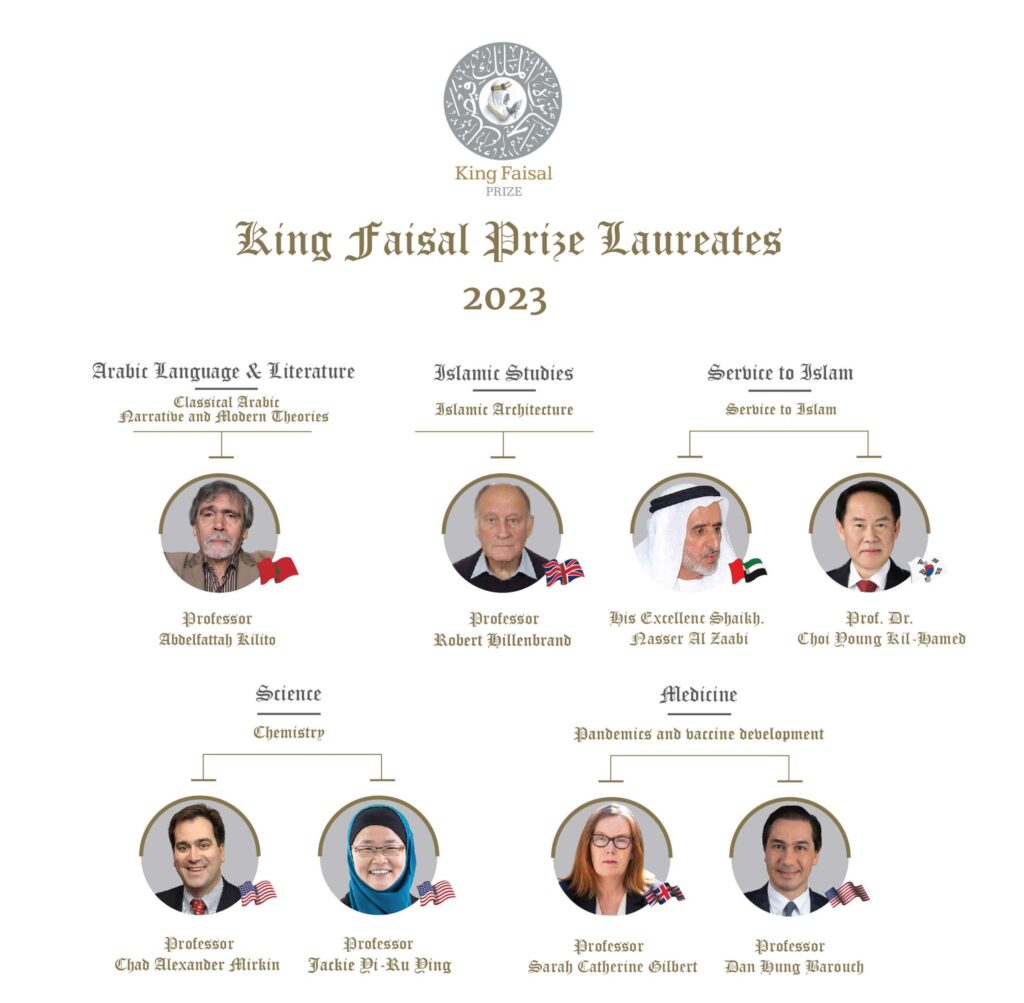An Emirati, a Moroccan, a South Korean, two Brits and three Americans were honored with the King Faisal Prize 2023.
They served people and enriched humanity with their pioneering work so deserve to be honored and recognized for their distinguished efforts, the King Faisal Foundation said when honoring the winners of the King Faisal Prize 2023.
A glittering award ceremony was held in Riyadh on Monday under the patronage of King Salman, and on his behalf, Prince Faisal bin Bandar, governor of Riyadh Region, attended the ceremony for handing over the King Faisal Prize to the winners this year.
The annual awards are the most prestigious in the Muslim world and recognize outstanding achievement in services to Islam, Islamic studies, Arabic language and literature, medicine and science.
This year an Emirati, a Moroccan, a South Korean, two Brits and three Americans won the prestigious prize, which in its 45th session recognized COVID-19 vaccine developers, nanotechnology scientists and eminent figures in Arabic language and literature, Islamic studies, and service to Islam.
The prize for service to Islam was awarded jointly to Shaikh Nasser bin Abdullah of the UAE and Professor Choi Young Kil-Hamed from South Korea.
The prize for Islamic studies was awarded to Professor Robert Hillenbrand from the UK.
The prize for Arabic language and literature was awarded to Professor Abdelfattah Kilito of Morocco.
The prize for medicine was awarded jointly to Professor Dan Hung Barouch from the US and Professor Sarah Catherine Gilbert from the UK.
In his acceptance speech, Barouch said, “The Ad26 vaccine for COVID-19 demonstrated robust efficacy in humans, even after a single shot, and showed continued protection against virus variants that emerged. This vaccine has been rolled out across the world by the pharmaceutical company Johnson & Johnson, and over 200 million people have received this vaccine, particularly in the developing world.”
Gilbert said that she was “humbled to join the other 2023 laureates, and to follow-in the footsteps of the men and women whose work has been recognized by the foundation for more than four decades. This award is in recognition of my work to co-create a vaccine for COVID-19. A low-cost, accessible, efficacious vaccine that has now been used in more than 180 countries and is estimated to have saved more than six million lives by the start of 2022.”
The prize for science was awarded jointly to Professor Jackie Yi-Ru Ying and Professor Chad Alexander Mirkin, both from the US.
Ying’s research focuses on synthesis of advanced nano materials and systems, and their application in biomedicine, energy conversion and catalysis.
Her inventions have been used to solve challenges in different fields of medicine, chemistry and energy. Her development of stimuli-responsive polymeric nanoparticles led to a technology that can autoregulate the release of insulin, depending on the blood glucose levels in diabetic patients, without the need for external blood glucose monitoring.
“I am deeply honored to be receiving the King Faisal prize in science, especially as the first female recipient of this award,” she said in her acceptance speech.
This year two women scientists have been honored as winners of the King Faisal Prize for medicine and science categories.
The woman behind the Oxford–AstraZeneca COVID-19 vaccine, Professor Sarah Gilbert, the Saïd chair of vaccinology in the Nuffield department of Medicine at Oxford University, was honored with the medicine award.
The other woman scientist honored with the King Faisal Prize in science is Professor Jackie Yi-Ru Ying; the A-star senior fellow and director at NanoBio Lab, Agency for Science, Technology and Research. She is a professor at Massachusetts Institute of Technology, and was chosen for her work on the synthesis of advanced nanomaterials and systems, and their applications in catalysis, energy conversion and biomedicine.
The King Faisal Prize was established in 1977. The prize was granted for the first time in 1979 in three categories: Service to Islam, Islamic studies and Arabic language and literature. Two additional categories were introduced in 1981: Medicine and science. The first medicine prize was awarded in 1982, and in science two years later.
Since 1979, the King Faisal Prize in its different categories has awarded 290 laureates who have made distinguished contributions to different sciences and causes.
Each prize laureate is given $200,000 (SR750,000); a 24-carat gold medal weighing 200 grams, a certificate inscribed with the laureate’s name and a summary of their work that qualified them for the prize, and the certificate signed by chairman of the prize board, Prince Khalid Al-Faisal.
source/content: arabnews.com (headline edited)
___________

______________________________________
MOROCCO / U.A.E. / SAUDI ARABIA